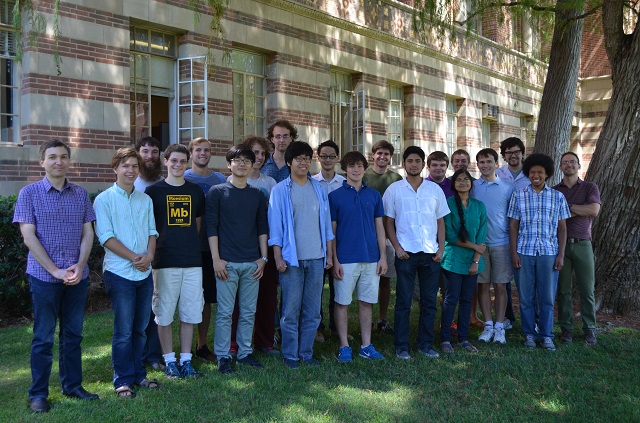
2015 Undergraduate Summer School
(This is the 2015 page. Are you looking for the current Summer School?)
The UCLA Logic Center held a three-week summer school for undergraduates in 2015, from Sunday June 21 to Saturday July 11.
The goal of the Center's summer schools is to introduce future mathematicians to central results and techniques from mathematical logic. Courses are very intensive, and reach advanced material, at a graduate level. They are designed to not require specific background in logic, but they do require high mathematical sophistication, for example from upper division or graduate courses in analysis or algebra. The summer school courses serve as good introduction to the kind of work that students of mathematics can expect in graduate school.
Each course in the summer school met daily for two hours of lecture, and one hour of guided problem solving in small groups. Each student took both courses offered. In addition to the six daily hours of course work and problem sessions (not to mention endless hours of extra work on challenging problem sets over evenings and weekends) there were lectures on topics of current research, social events, and planned outings in the area.
Thanks to an NSF grant (DMS-1044604) and Logic Center support we were able to provide admitted students with a stipend of $3,000, travel allowance up to $500, and dormitory housing at UCLA for no charge (double occupancy rooms, breakfast and dinner included).

Topics in 2015:
Determinacy
Instructor: Sherwood Hachtman
Principles of determinacy state the existence of winning strategies in certain two-player games of infinite length. They were initially considered in the '30s and '50s in connection with various topological properties; for example the famous Banach-Mazur game relates determinacy to the Baire property and other games relate determinacy to the perfect set property and Lebesgue measurability. Despite their somewhat humble beginnings, these innocuous-looking principles are today understood to have surprisingly deep connections with set theory at the highest and lowest levels of the infinite. At the high end they are intricately connected to large cardinal axioms, and at the low end they can be used to develop a deep structure theory for definable sets of reals. In this course we will explore the effects that determinacy hypotheses have on the structure of the set theoretic universe and especially on the real line, while simultaneously introducing students to basic techniques and tenets of descriptive set theory. We will also investigate the extent to which determinacy can be realized just on the basis of the classical mathematical axioms.
First order logic and Gödel's incompleteness theorems
Instructors: Zach Norwood and John Susice
At the beginning of the 20th century mathematics experienced a crisis due to the discovery of certain paradoxes, e.g. Russell's paradox, in previous attempts to formalize abstract notions of sets and functions. To put analysis on a firm foundation, similar to the axiomatic foundation for geometry, Hilbert proposed a program aimed at a direct consistency proof of analysis. This would involve a system of axioms that is consistent, meaning free of internal contradictions, and complete, meaning rich enough to prove all true statements. But the search for such a system was doomed to fail: Gödel proved in the early 1930s that any system of axioms that can be listed by some computable process, and subsumes Peano arithmetic, is either incomplete or inconsistent. This is the Gödel incompleteness theorem, and we will prove it in the second half of this course. In the first half, we will develop the framework of first order logic, culminating in a proof of the compactness theorem, one of the most useful tools of logic. In addition, we will discuss applications in various fields of mathematics such as combinatorics and algebra.
Links to previous years' summer schools:
The 2014 Summer School.
The 2013 Summer School.
The 2012 Summer School.
The 2010 Summer School.
The 2009 Summer School.